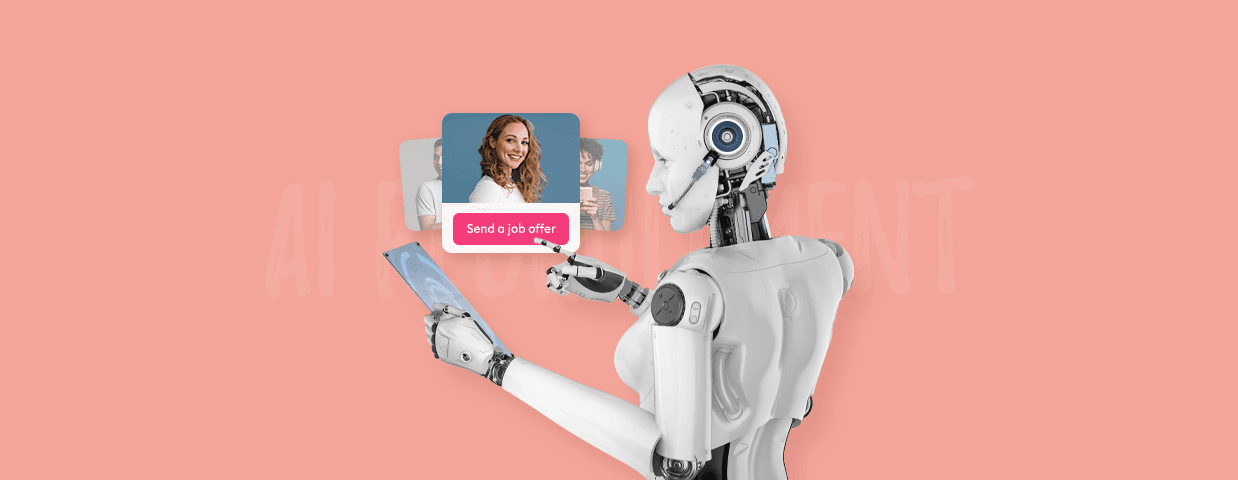Companies receive around 250 resumes for each corporate job opening.
It is more than enough to keep HR teams busy. Imagine going through all those documents! And this is just the first stage of the candidate screening process.
It should come as no surprise that being a recruiter is a tough profession. They need to make decisions on every application they receive.
But what if businesses let AI take care of finding the perfect job candidates?
We asked 1,068 people and these are the results of our study.
AI in recruitment: major findings
Machine learning recruitment and AI in hiring processes have been hot topics lately. And not without reason. More and more companies use this technology to aid their HR team with applications and human resources planning. So—let’s dive straight into our findings on the use of AI in recruiting jobs and how technology has changed the hiring process:
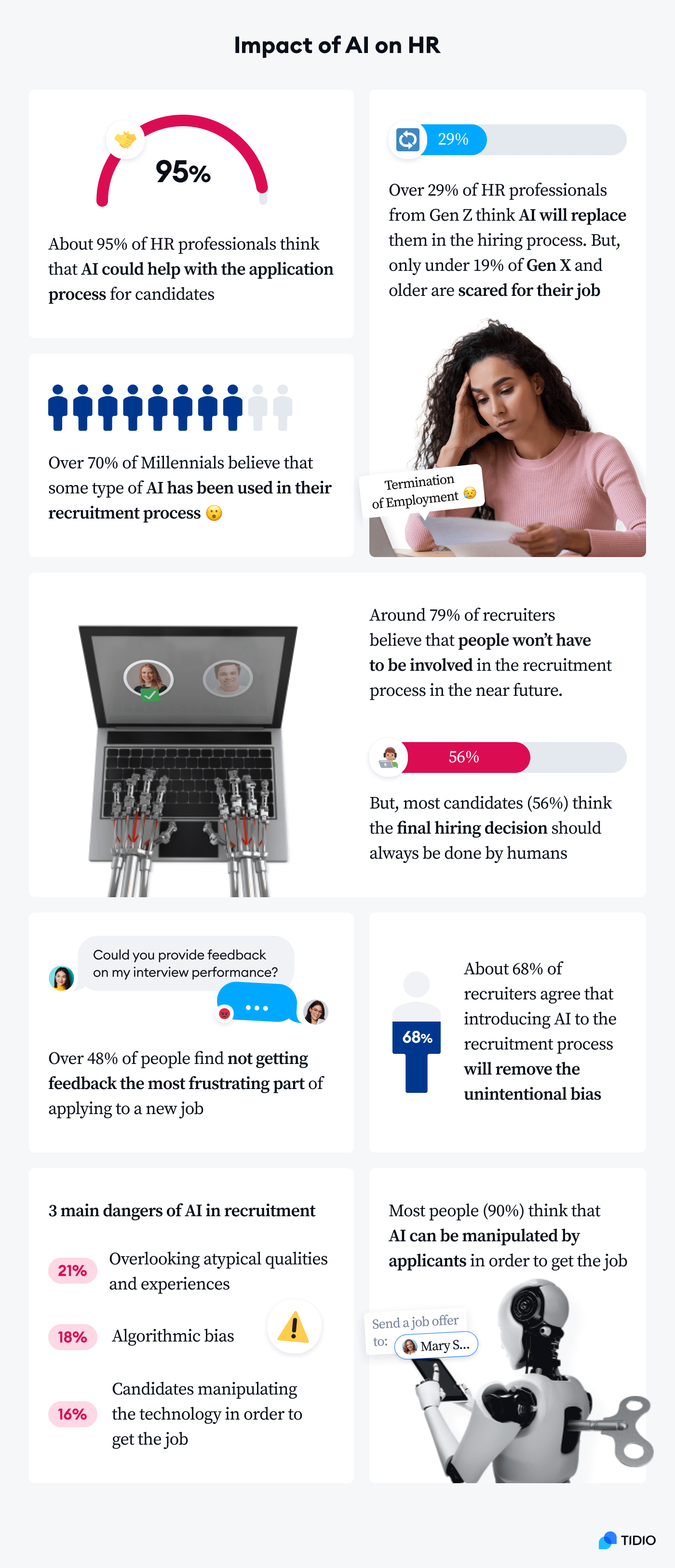
1. Nearly 67% of HR professionals believe that AI has many benefits and a positive impact on the recruitment process.
People think AI will free up the recruiter’s time (44%), provide valuable insights during the recruitment process (41%), and make the recruiter’s job easier (39%). But there are also those who believe that the use of artificial intelligence in hiring processes could lead to overlooking unique and unconventional talents (35%) and destroy the HR industry (26%).
2. Around 85% of recruiters think that AI is a useful technology that will replace some parts of the hiring process.
Only about 15% of HR professionals believe that humans are irreplaceable and necessary throughout the whole recruitment process. Also, around 23% think artificial intelligence will replace them in the process and they’re scared for their job.
3. About 79% of recruiters believe that artificial intelligence will soon be advanced enough to make the hiring and firing decisions. Whereas, only about 43% of candidates share this opinion.
A whopping 56% of applicants don’t want AI to make decisions related to hiring and firing employees. Interestingly, only about 22% of recruiters answered the same.
4. Only about 31% of respondents would agree for AI to decide whether or not they get hired for the job.
However, this number increases to 75% if there’s a human presence involved in the decision as well. Only about 25% of participants think artificial intelligence making recruitment decisions is completely unfair.
5. About 89% of respondents think that AI could help with the application process for candidates.
Only about 11% of the participants believe that there’s no use for artificial intelligence from the candidate’s side during the application process. And, this number shrinks to only about 5% when we look at what the recruiters believe.
As businesses increasingly look to expand their operations, hiring international employees has become a key strategy. AI recruitment tools are revolutionizing this process, making it easier for companies to find qualified talent from around the world and support compliant hiring through employer of record services.
Top artificial intelligence in HR statistics to know about in 2022
What do recruiters think about using artificial intelligence in hiring? Are they concerned about their jobs? Or are they glad to have some tasks lifted off their shoulders?
How is artificial intelligence changing the recruiting process?
Well—Let’s find out!
AI will replace parts of the recruitment process.
Some claim that AI is on its way to replace HR professionals in recruiting new employees. But can it really do the job of employing candidates from the start till the very end? Our study shows that most recruiters think AI will replace them at least in some parts of the process.
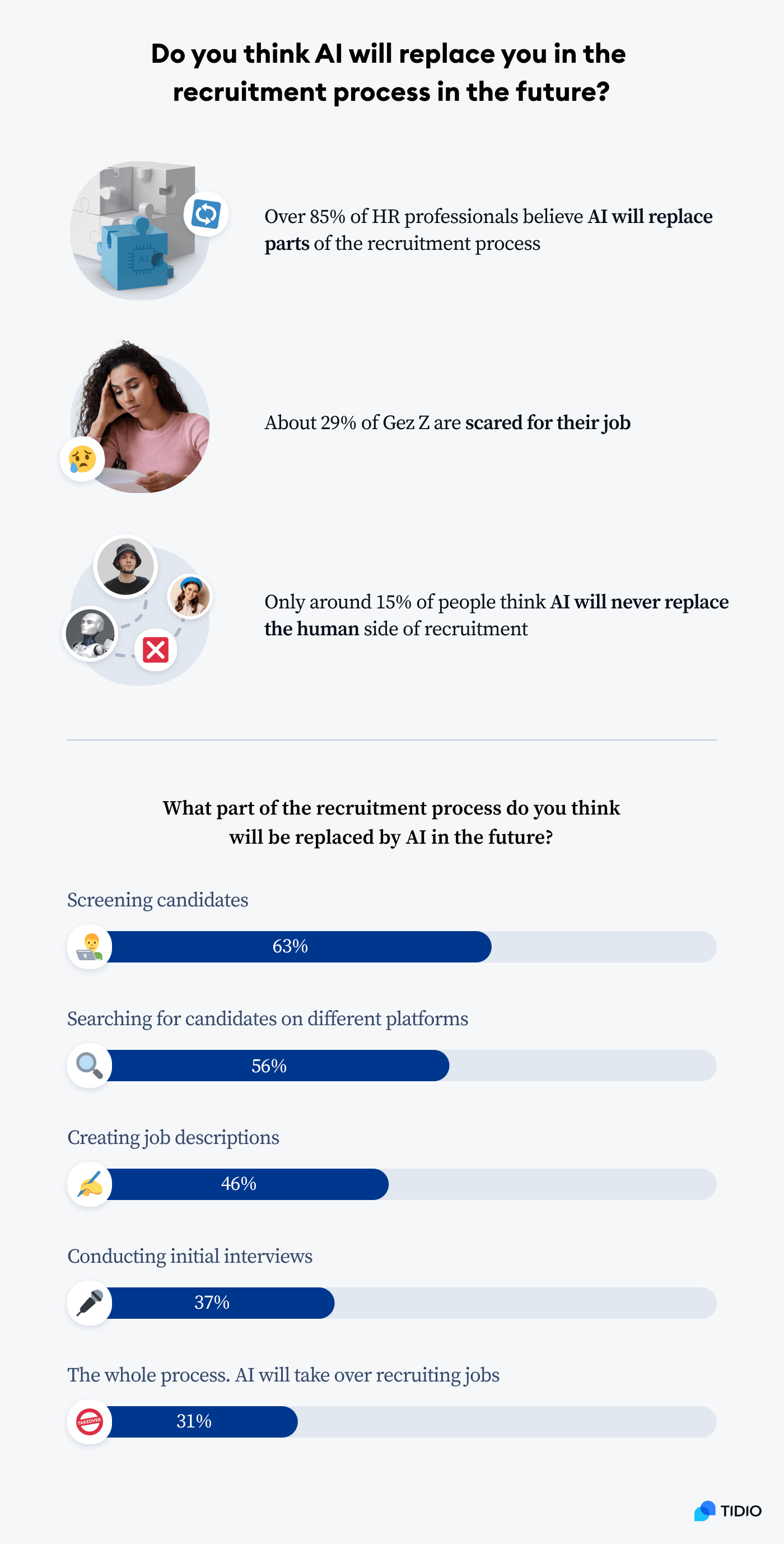
AI-driven tools leverage sophisticated technology stacks, including natural language processing (NLP), machine learning algorithms, and cloud-based infrastructure. These components work together to screen resumes, conduct sentiment analysis during interviews, and even predict candidate success based on historical data.
Artificial intelligence might be able to work smartly, but it misses the human touch and evaluation skills needed for the final stages of the hiring process.
Over 62% of respondents say that AI recruitment tools will replace some parts of the hiring process, but the final stages will always be done by the recruiting teams. What tasks can be replaced?
The most common ones are screening candidates (63% of respondents), searching for qualified candidates on social media and different platforms (56% of respondents), and creating job postings (46% of respondents).
Our findings are in line with other studies showing that AI recruitment tools are powerful, but they need human input to build and maintain them. The hiring process can become more accurate and cost-effective when automation technology is used to align candidates’ data sets and build profiles. But the recruitment process requires input from hiring managers to function correctly.
In addition to that, we found that at least 1 in every 5 recruiters is concerned about AI-based recruitment taking over their jobs. And only about 15% of hiring professionals say that they’re not scared because AI will never replace the human side of recruitment.
Whether it takes over or not, let’s see what could be the main benefits of using AI in the hiring process.
About 68% of recruiters believe using AI in the recruitment process will remove the unintentional bias.
One of the biggest benefits of AI in recruitment is the opportunity to remove human biases from the hiring procedure. The majority of the respondents (59%) agree that introducing AI to the recruitment process will remove unconscious bias. And only about 14% disagree with that claim.
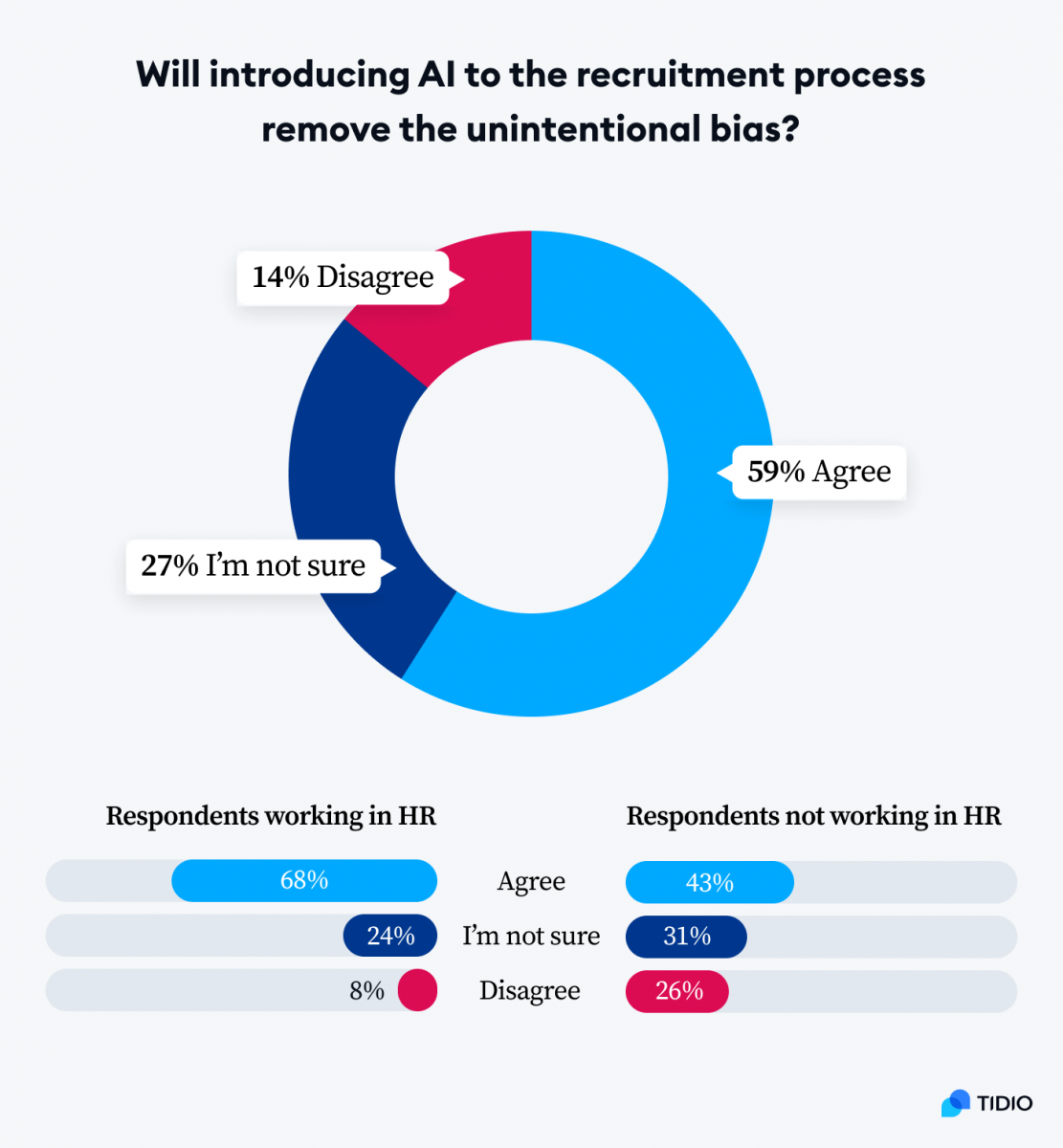
Some previous studies found that AI can be effective in removing unintentional bias by focusing solely on the skill sets and candidate experiences. This can support a more diverse workforce.
However, there are examples of the AI learning the unintentional bias, reproducing and exaggerating it. One of these cases happened at Amazon when their algorithmic bias was discriminating against women applicants for positions historically taken by men. So, recruiters need to be careful and monitor the technology to ensure the right functionality of it.
So, if AI can help to limit bias during the hiring process, how can recruiters use it to assist them the most?
Screening candidates is the most challenging task during the recruitment process for about 43% of HR professionals.
Studies show that talent acquisition professionals spend, on average, nearly ⅓ of their workweek sourcing job seekers for a single role! That’s about 13 hours spent every week looking for the best candidate. But what in that process is the most challenging for them?
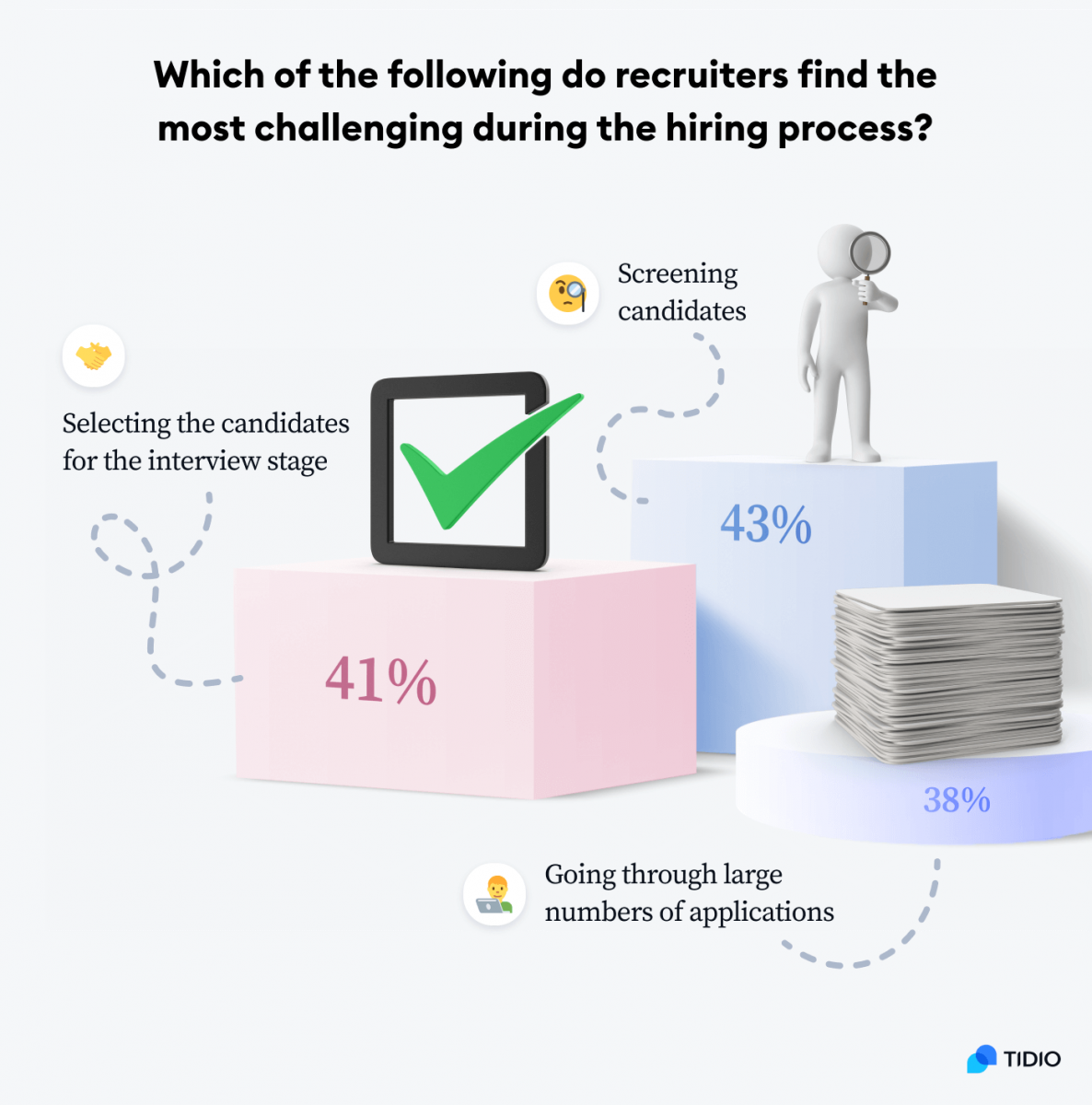
The most challenging tasks are screening candidates (43% of respondents), selecting candidates for the interview stage (41% of recruiters), and going through large numbers of applicants (38% of respondents).
From this data, we can conclude that recruiters want to avoid screening large numbers of applicants. However, this is a vital task to select the candidates with the right experience and qualifications for the interview stage.
This could be the perfect opportunity for AI to step in. It could relieve the HR professionals and screen CVs to bring the right candidates forward to the interview stage.
The majority of respondents (89%) think that AI could help with the application process for candidates.
This number is even higher for recruiters. About 95% of them believe AI can be used to help applicants with the process. But what could it help with?
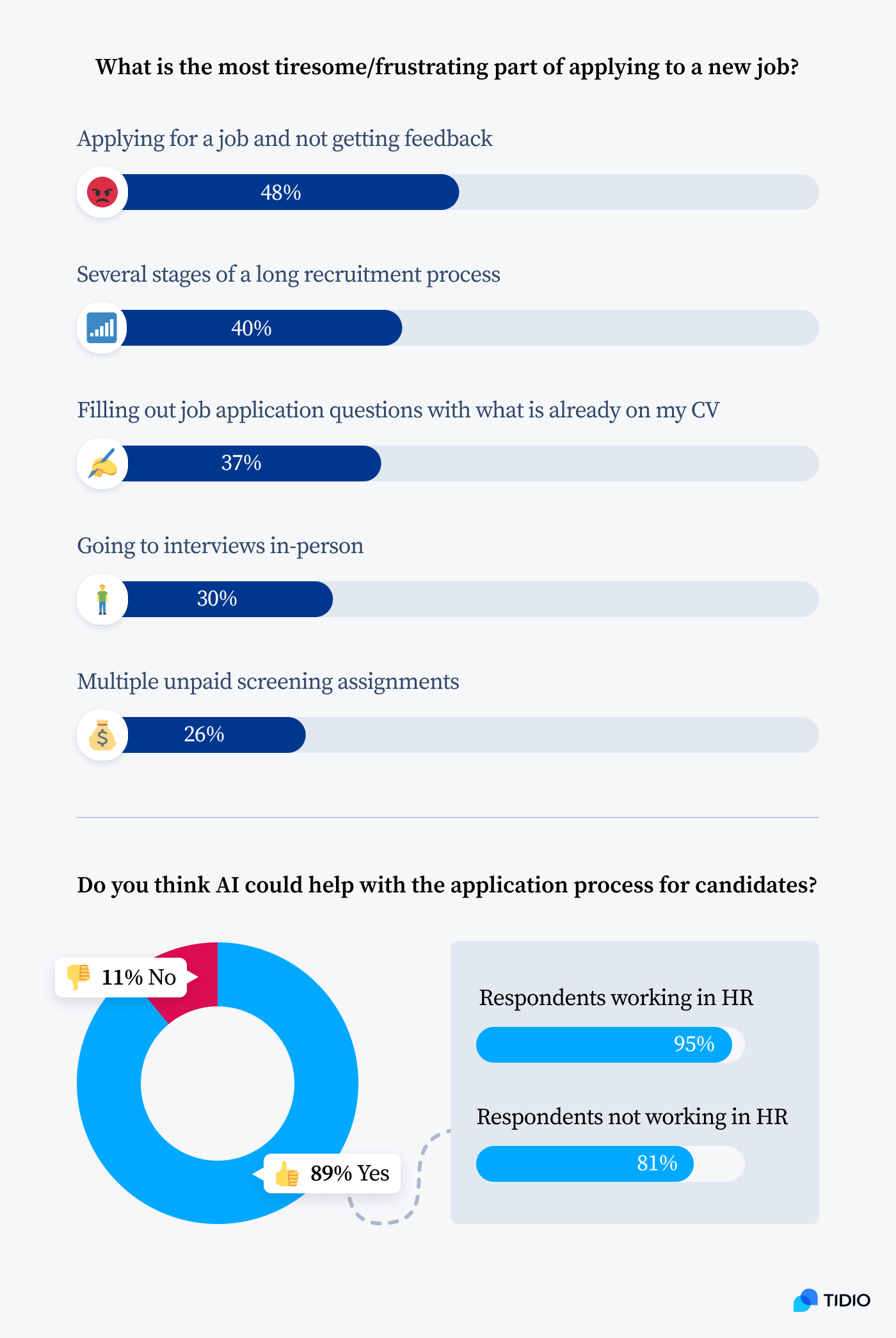
The most frustrating parts of applying for a new job are not getting feedback, going through several stages of the process, and filling out application questions with what’s already on your CV. We also discovered that only under 14% of recruiters want help with providing feedback to candidates. This presents a gap that could be bridged by AI.
One way AI could help candidates is by generating feedback after an application has been reviewed. Applicants could also improve their chances by writing an ATS-friendly resume which artificial intelligence could easily process and decide if they’re the right fit for the organization. It could be especially useful for proptech recruiters, fintech recruiters and other recruitment specialists who work in niche fields.
People thinking that AI can help with the application process for candidates might have stemmed from experiencing discrimination from human recruiters. A study found that nearly half (44%) of applicants report discrimination in the hiring process. Also, AI is thought to minimize human bias, which could further improve the application process for candidates.
Some of the best AI tools for the talent acquisition process include recruitment chatbots to answer common questions and applicant tracking systems. These can improve the quality of hires, remove some time-consuming tasks, and help your agents reach their KPI metrics.
Okay—there are many benefits of artificial intelligence in hiring but what about its dangers?
Using AI in recruitment was considered dangerous in itself twice less often by Gen Z than by older respondets (40+).
Is the use of artificial intelligence for hiring purposes dangerous? According to our respondents, it isn’t really, at least not completely.
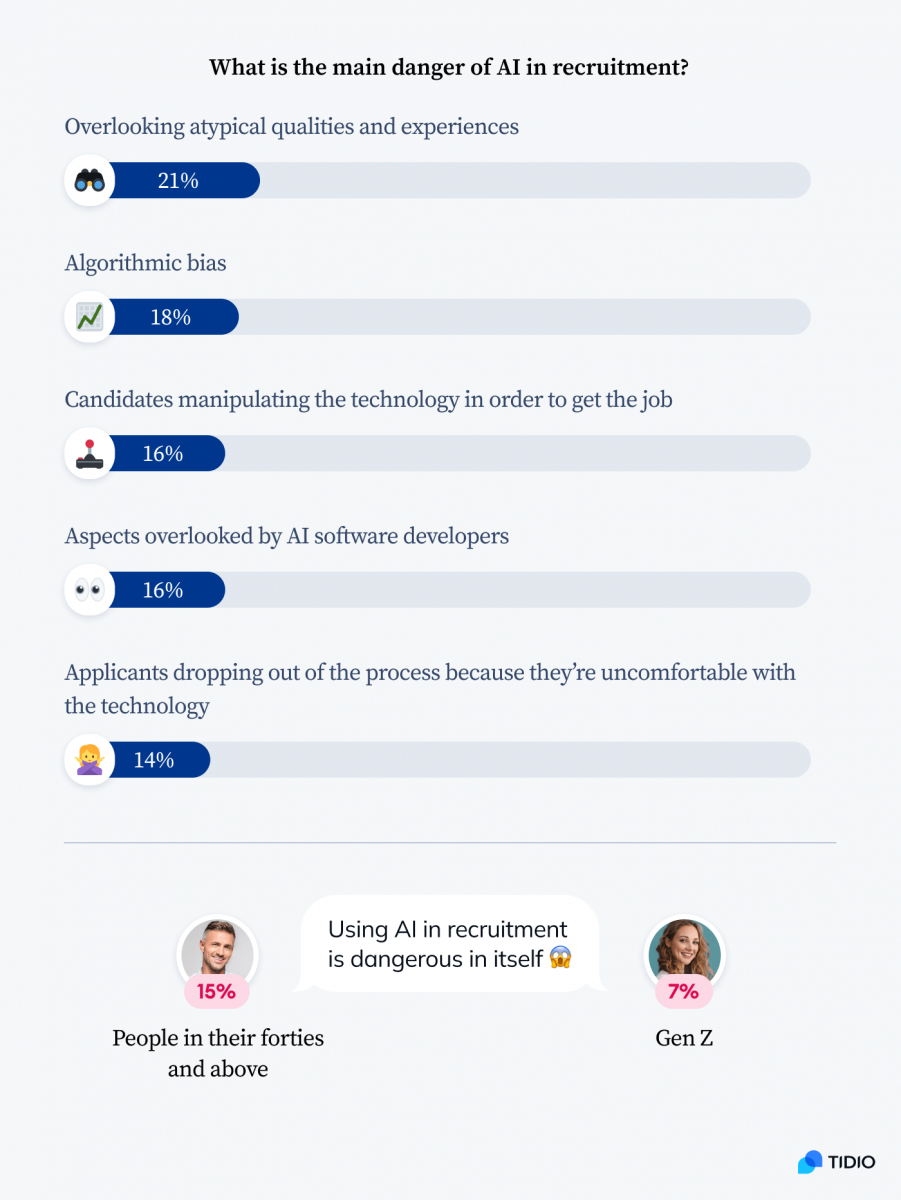
Only about 13% of the participants worry that using AI in recruitment processes is dangerous in itself. However, most of them (87%) think that there are some risks related to it.
These dangers have caught public attention a few years back with Amazon’s and LinkedIn revealing the algorithmic bias in their AI recruitment bots. With the acts in place holding the employer liable for any discriminatory effects of the algorithm’s use, management should examine ethical concerns and legal restrictions before using the technology for HR purposes.
Over 68% of respondents want a human presence in the final decisions of the hiring process.
Almost half of the people (44%) would agree for AI to decide whether they are hired for the job but only if there was a human presence involved as well.
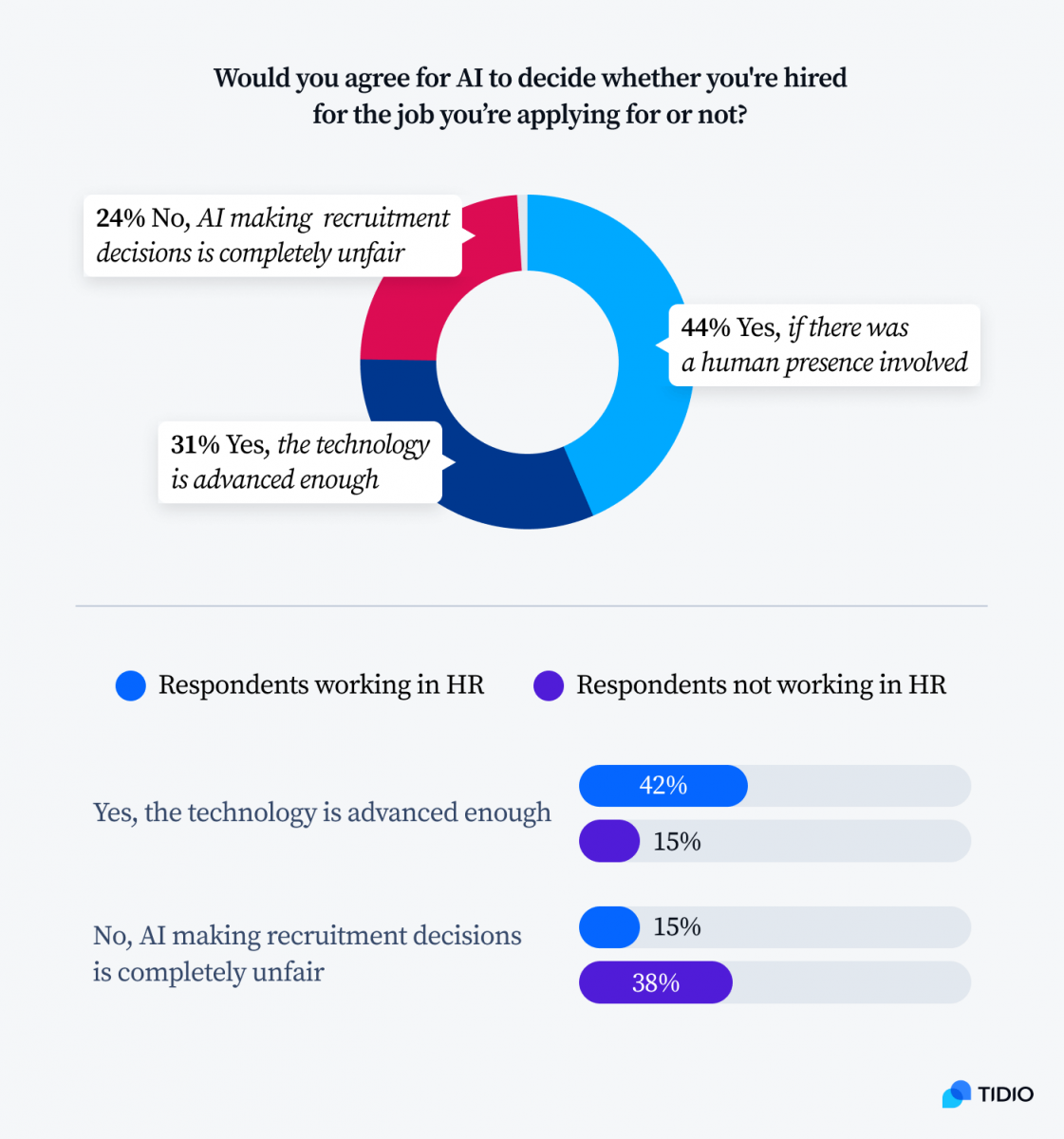
We also discovered that about 60% of our participants wouldn’t want to be recorded during the initial interview process. But 35% of them would agree to it if there was no other choice. Only around 40% of our respondents said they trust AI technology when it comes to recording them and analyzing the body language during the interview.
Another finding of our research presented that most people (53%) would trust a recommendation from a friend or a coworker over AI when it comes to giving a candidate a shot at the recruitment process.
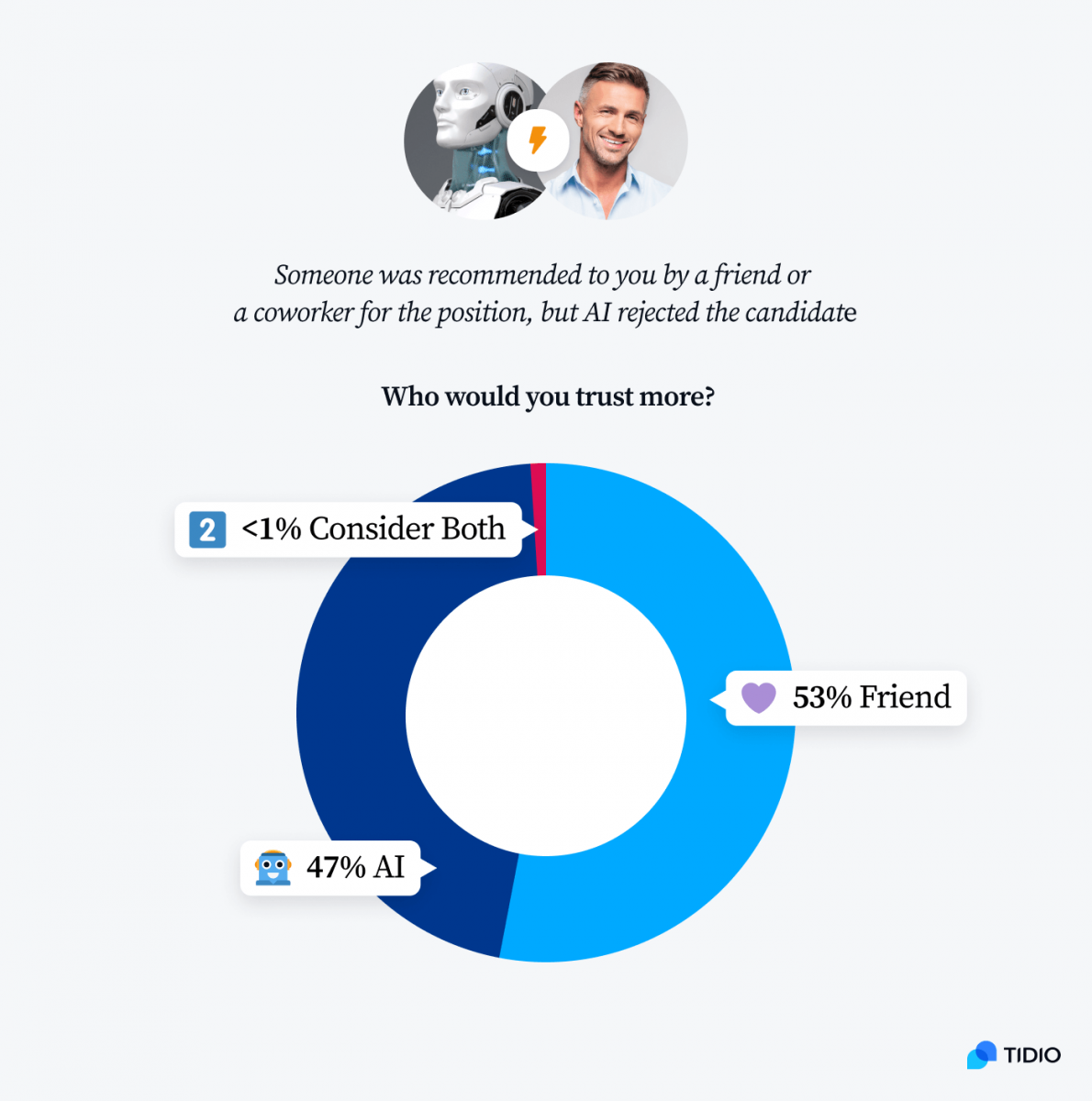
The distrust could be related to the human bias being copied and exacerbated by AI when it comes to gender and ethnicity. This was shown in studies where AI learned the human bias and applied it when sorting resumes.
But, the use of the technology was reviewed, and in December 2021, New York City Council made an announcement about it. From then onwards, companies using AI have a responsibility to disclose to applicants how the technology was used and give candidates options for an alternative approach.
Will the human presence in the recruitment process disappear soon?
About 77% of HR professionals believe that soon people won’t have to be involved in the recruitment process AT ALL.
The majority of candidates (56%), on the other hand, think the final decision should always be made by human employees. Also, only about 21% think the technology is advanced enough already to make these decisions.
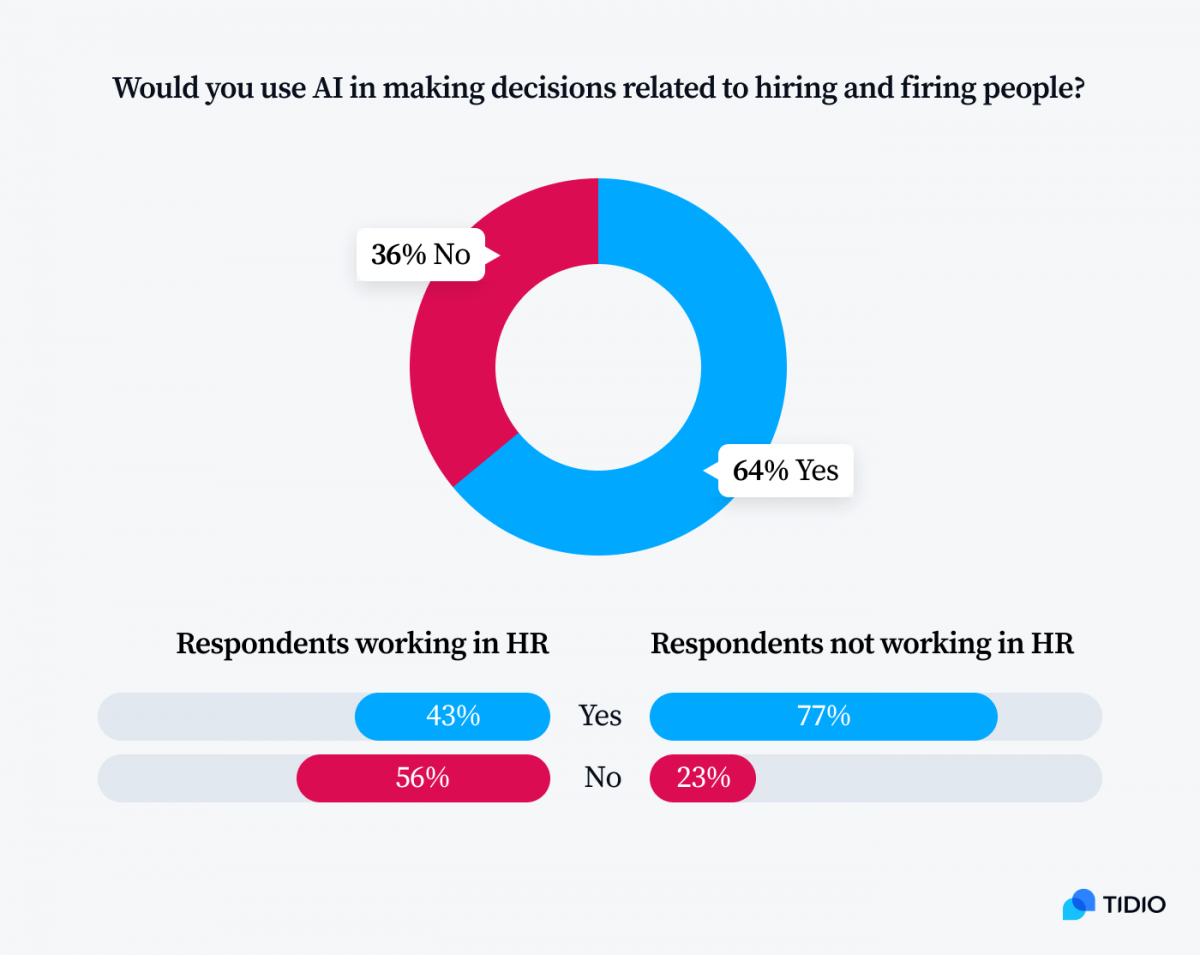
Forbes article argued in 2019 that recruitment AI cannot be adopted in a black box, meaning it cannot be used without the knowledge of its internal working. And this hasn’t changed.
The technology needs to be constantly evaluated and used primarily for the initial stages of the recruitment process. But humans are needed for the closing stages when human relationships play a vital role.
If AI takes over, can we stop people from manipulating it? Or is the technology not advanced enough yet to not let that happen?
Over 90% of people think that artificial intelligence can be manipulated to some extent.
And from these respondents, above 46% think that it can be easily manipulated. Only about 9% of respondents consider AI to be advanced enough to not be manipulated.
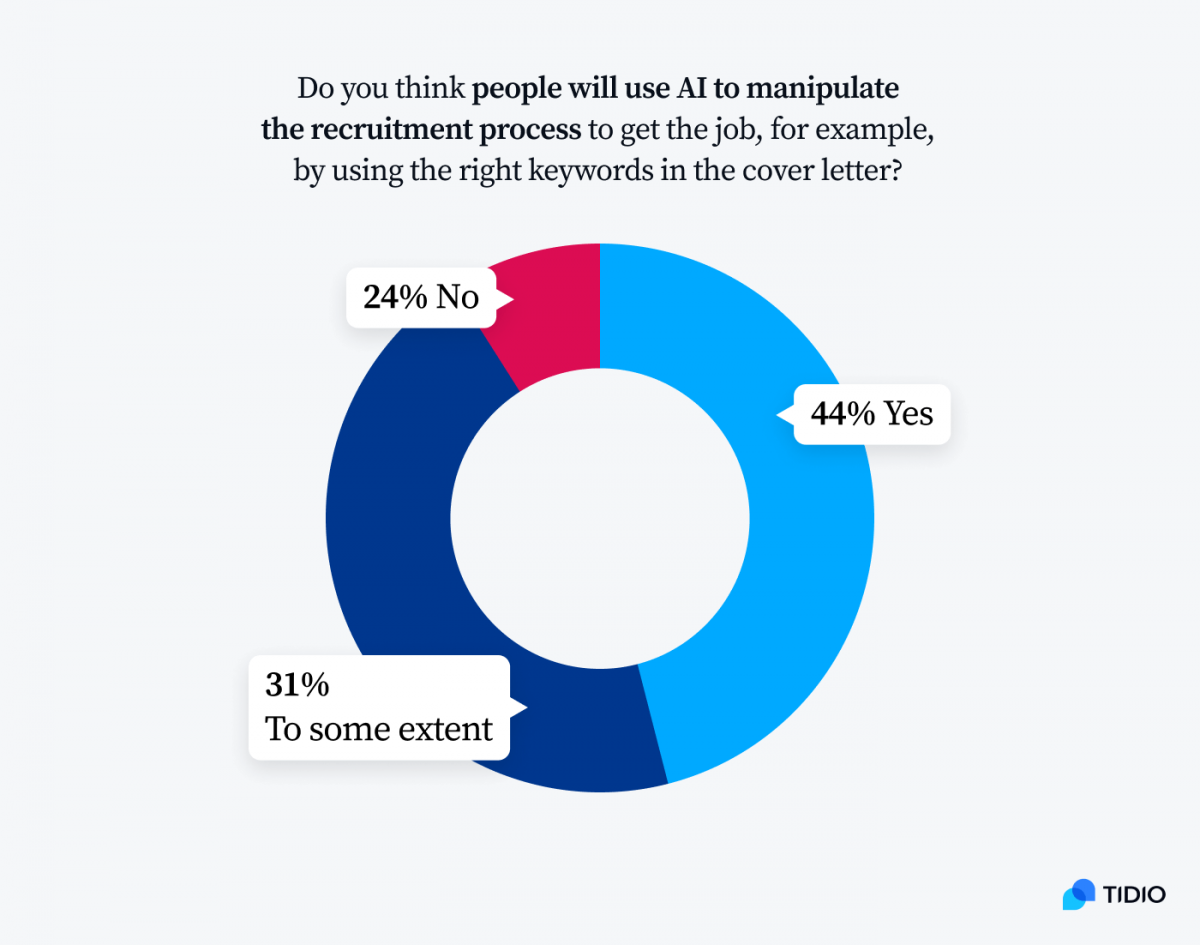
Some of the advantages of AI are that it saves time, removes bias, and improves candidate’s experience. But the disadvantages of it are that it’s imperfect and too simplistic in its workings.
The technology can identify a person as the perfect candidate based on the keywords used in their application. But what if they changed jobs several times in one year or are not a good fit based on the personality? That’s where a human recruiter needs to come into the process.
How many companies use artificial intelligence already? And how many applicants suspect it was used in their recruitment process?
The majority of recruiters (65%) already use AI in the process of recruitment.
Our results come in comparison to a 2015 study which stated that 75% of talent managers use AI recruiting software. In our 2022 research, we found that only 66% of recruiters use it.
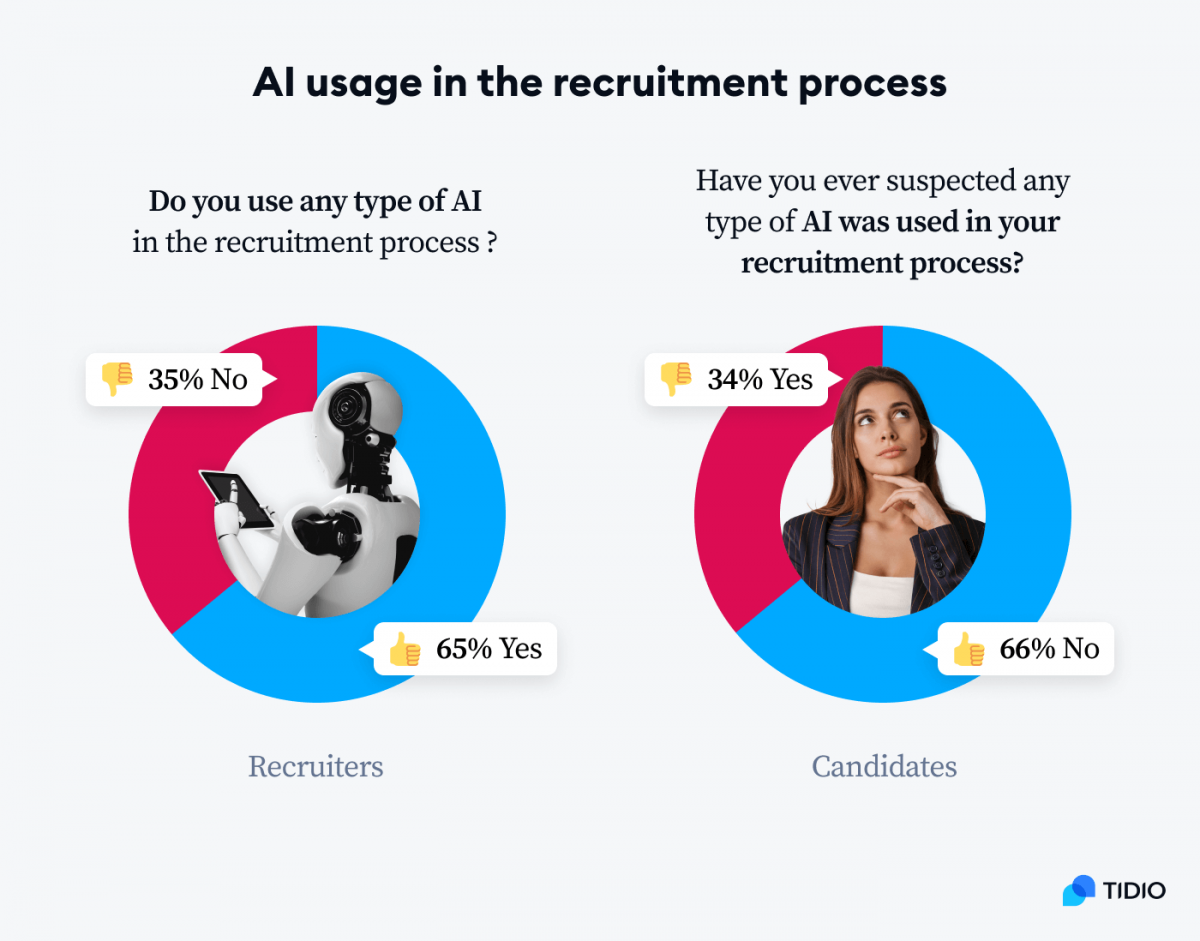
Nonetheless, the use of AI technology is growing, and we can see that by the results of our study. Above 70% of Millennials suspected the use of AI in their recruitment process. This number shrinks to just about 59% for people in their forties and above.
The trend of using AI for recruiting is likely to continue to grow as many states impose laws for the use of this technology when hiring people. One of these states is Illinois which was the first state to enact the Artificial Intelligence Video Interview Act (AIVIA). It imposes duties of transparency, data destruction, and consent on organizations that use AI evaluation of interviewees for jobs.
Okay—let’s skip ahead a little bit and say that you’re hired. Would new employees like to be onboarded by AI or do they want the human interactions in those first few weeks of work?
Most of the people (76%) wouldn’t mind being onboarded by AI.
And only about 7% would be offended if they were onboarded by artificial intelligence instead of a human.
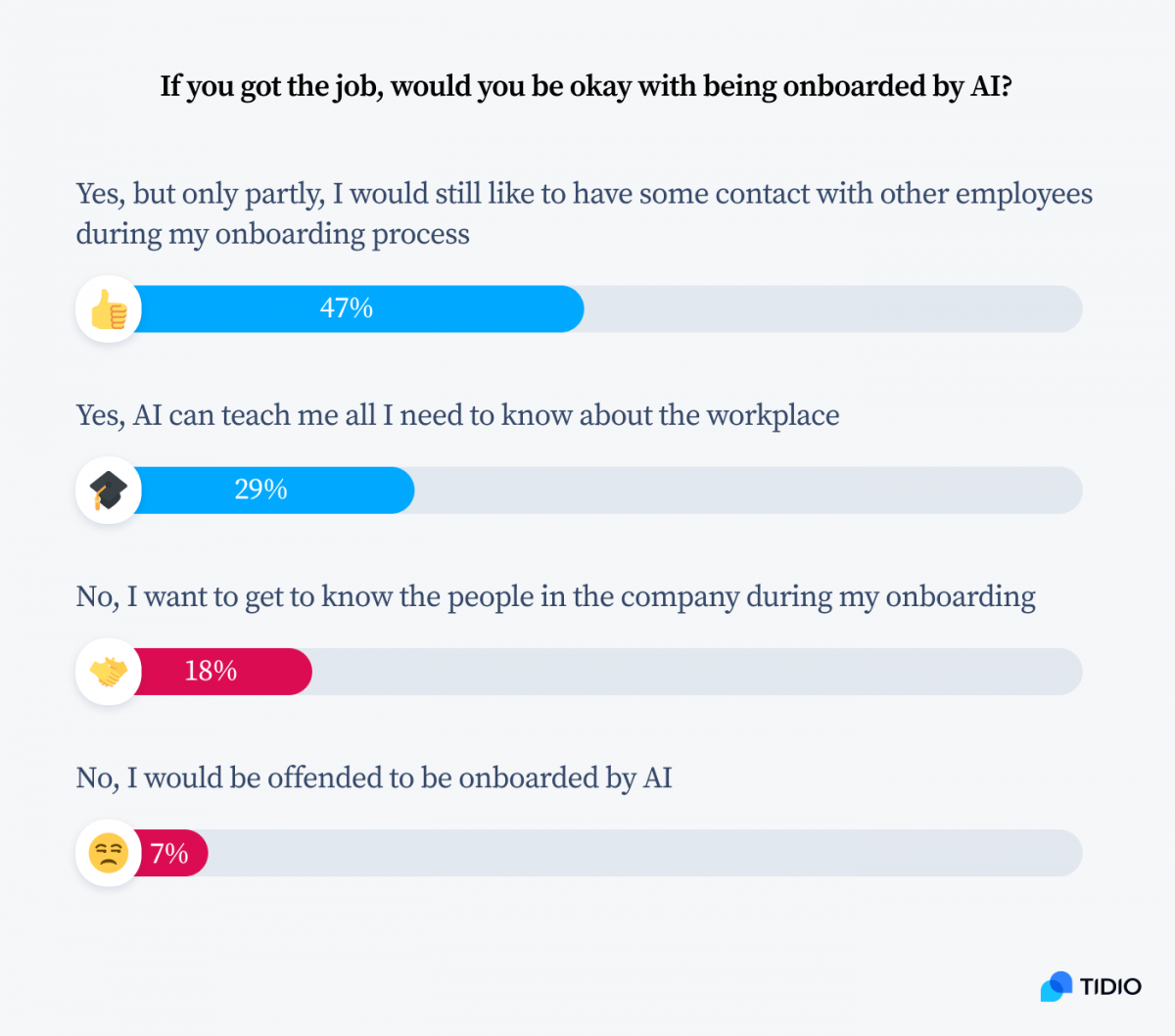
However, the majority of new employees, about 65%, still want to get to know other people in the company during the onboarding process. Some of them (47%) would be okay with being onboarded by AI as long as they have contact with other employees but 18% don’t want artificial intelligence in that process at all.
But does it matter what job sector you’re using artificial intelligence in talent acquisition for? Or is it all the same, whether it’s construction, health care, or IT?
Over 87% of people think that AI is more useful in recruitment in some job sectors than others.
And that number reaches 96% when it comes to HR professionals.
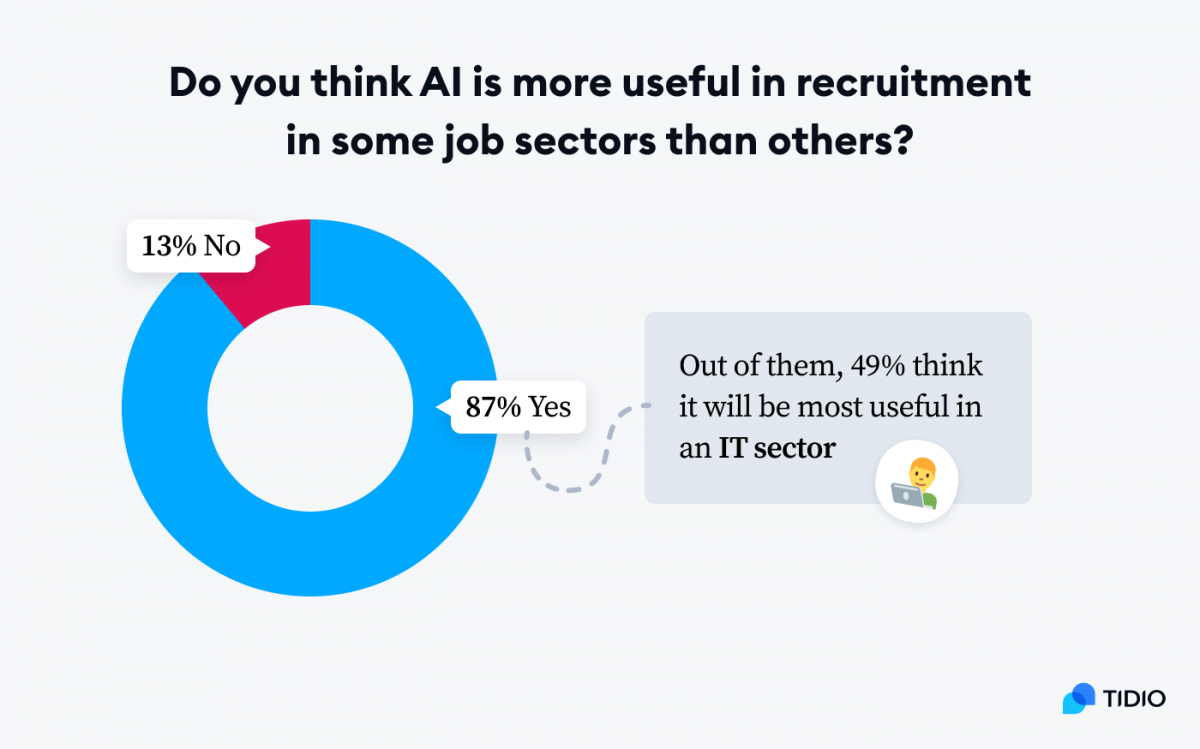
Which sector?
Well— Around 49% said computer and technology sector. The next sector has a drastic drop in percentages, down to just over 7% of respondents thinking adverting and marketing. Also, just under 7% think it would be most useful in finance and economy industry.
A study published by the University of Texas found similar results. They concluded that AI benefits differ by the type of candidate roles and decisions the system is built to assist. So, when considering adopting AI in recruitment, employers need to evaluate its use in their sector to know its benefits and drawbacks.
Artificial Intelligence recruitment: Key findings
So, how is AI in HR changing the recruiting process?
It aids the HR professionals and decreases the unintentional human bias in the process. But employers need to be careful when using AI for hiring candidates as more and more states are enforcing laws regarding the technology.
Make sure you’re transparent and fair in the recruitment process. That way, you’ll be on the safe side with the law enforcement, your recruiters, and the candidates. Scroll back up to double-check what people are okay with and what they’re against.
Sources:
- Entelo 2018 Recruiting Trends Report
- 50 HR & Recruiting Stats That Make You Think
- Recruiting Software Impact Report
- Employers Using Artificial Intelligence To Recruit Workers
- How to Create ATS Resumes That Pass Filters (With Templates)
- Recruitment Through Artificial Intelligence: A Conceptual Study
- Illinois Artificial Intelligence Video Interview Act
- New Perspectives on Diversity & Inclusion in Hiring
- Amazon Scraps Secret AI Recruiting Tool That Showed Bias Against Women
- Beat the Bots: Employer Risk in Delegating Hiring Practices to Artificial Intelligence— A Dilemma Worth Solving
- LinkedIn Coughed Out AI Bias! Is AI in Recruitment Reliable?
- A Face-Scanning Algorithm Increasingly Decides Whether You Deserve The Job
- Why New York City Is Cracking Down On AI In Hiring
- Entry Barriers For Women Are Amplified By AI In Recruitment Algorithms, Study Finds
- How AI Is Uprooting Recruiting
- The impact of AI on recruitment
- Algorithmic Hiring in Practice: Recruiter and HR Professional’s Perspectives on AI Use in Hiring
- The Employment Situation – December 2021
Methodology
For this study about AI in recruitment, we collected answers from 1,068 respondents. We used Amazon Mechanical Turk.
Respondents were 54% males and 46% females. The sample’s average age was 39. They had to answer about 26 questions, the majority of which were multiple choice. The survey had an attention check question.
Fair use statement
Has our research helped you learn more about AI technology in recruitment? Feel free to share statistics from this study. Just remember to mention the source and include a link to this page. Thank you!
